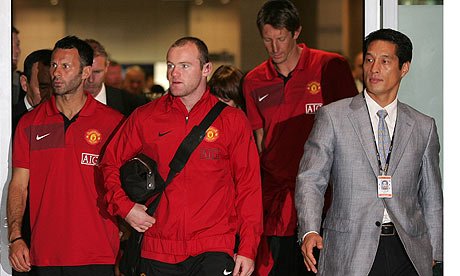Manchester United achieving their main goal in Asia
-

United are winning on and off the pitch on tour as they continue to target the huge Asian market.
The sight of a small room creaking with journalists and television cameras does not usually enthuse Sir Alex Ferguson. But after 90 minutes of a match against Malaysia that was exhausting simply to watch, the Manchester United manager was grateful simply for the air conditioning boasted by the press room in the Bukit Jalil stadium.
There is no sound footballing reason why United were there. The one-time England wicket-keeper, Jack Russell, prepared for an England tour of the West Indies by going into a sauna fully kitted out in cricket gear but United's attempt to become the first club to win four successive league titles will be decided by how they endure an English winter. And nowhere, not even at Portsmouth in August, will they find a combination of 80% humidity and 35 degree temperatures.
Logically, Manchester United should be with Arsenal in the Alps. The Malaysian side they overcame in two sweat-streaked matches in Kuala Lumpur might have been better than the bunch of Viennese amateurs, SC Columbia, that Arsenal thrashed 7-1 but not by much. And certainly not by enough to justify the 36 hours of flying the team will endure on this tour.
Nevertheless, their arrival into South Korea on Wednesday was second only to the solar eclipse that darkened much of the country as a news event. Despite the adverts for Chelsea's shirt sponsor, Samsung, that are on every other building, South Korea is prime marketing territory for Manchester United. If, as Rio Ferdinand recently remarked, being a United player is akin to being in the Beatles, the ground where they will perform in front of 64,000 on Friday is their equivalent to Shea Stadium.
This is a nation where to belong is everything – the friends the South Koreans make at school tend to stay with them for life. It is a nation where wearing a non-official club shirt would be considered degrading and in the shape of Park Ji-Sung, United possess the supreme vehicle to sell them. It is a nation where, incidentally, 1.2m people have Manchester United credit cards.
Park has joined the tour in Seoul, his home city, where he is still revered for the fight and unwillingness to give up that took South Korea to the semi-finals of the 2002 World Cup. In Malaysia, the crowds that flooded into the team hotel had Wayne Rooney as their prime target. Here, there is another hero.
Tomorrow, Park will captain a team of youngsters against one led by Rain, Korea's equivalent to Robbie Williams without the UFO obsessions. Players will also be provided for a training session with teenage footballers. None are likely to be able to leave their hotel without being mobbed.
If United are winning over their target markets in Asia, however, they appear to have given up on the American market, unlike Real Madrid, who are touring the States at the same time as Barcelona. Despite United's links with Nike, based in Seattle, they have found it a difficult market to break and have no immediate plans to return.
India, which the magazine Sports Business has called "the last huge market left for football", is more interesting. The subcontinent's turnover from television rights and sports sponsorship is collectively worth $600m and Manchester United, with their deep links to Asia laid down as long ago as 1975 when as Second Division champions they attracted crowds of 70,000 in Indonesia, are well placed to grab a slice. Madrid, meanwhile, have brought forward some of their kick-off times so they can be screened at prime time in South East Asia.
Ferguson has remarked that Manchester United are considerably less glamorous when seen from the inside, saying they are like a small family business. Here, you see his point. Ken Ramsden, the club secretary, has been with them since he was a boy – his mother polished the coffins when the dead from the Munich air crash were laid out in the Old Trafford gymnasium. Old heroes such as Paddy Crerand and Bryan Robson are taken along. Their media officer, Diana Law, is the daughter of Manchester United's greatest striker Denis. David Gill, their chief executive, in contrast to his counterparts at City and Chelsea, has the air of a family solicitor.
But they are very effective at hoovering up money without causing offence. They have never, as Real Madrid did in Japan, asked for a shopping centre to be closed so their players can spend quality time with their American Express cards. Even when he is asked for the 43rd time about Cristiano Ronaldo in an accent he can barely fathom, Ferguson will respond. He will even allow journalists to pose for pictures with him, a practice he does not encourage at Old Trafford.
In January 2008 they flew to Saudi Arabia for a game that even by modern standards appeared pointless. It was a testimonial for Sami al-Jaber, a player, who it is fair to say, few at Old Trafford had heard of. It was not an enjoyable trip. Riyadh was surprisingly cold, there was nowhere save the British Embassy where you could get a drink and time hung heavy. Seven months later, the Saudi Telecom Company announced a five-year contract to market Manchester United in the country, worth a reported £9.3m to the club. The real result of the match.